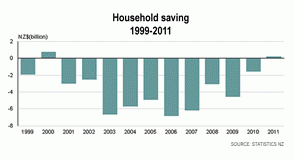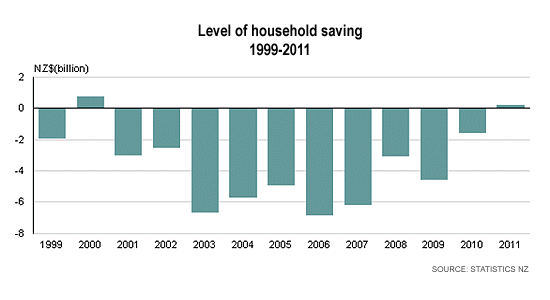
By Pattrick Smellie
The wallet-freezing effects of the global financial crisis, finance company collapses and prolonged local recession have had one good outcome, with New Zealand households saving $200 million more than they earned in the year to March.
Statistics New Zealand released the latest institutional sector accounts this morning, showing households recording their first year of net savings since the turn of the century, in 2000.
By comparison, in the year to March 2010, households spent $1.6 billion more than they received in income. While the latest savings total equates to just 0.2 percent of net disposable household income, the switch in behaviour is significant.
The imbalance between household spending and income peaked in the year to March 2006, when households spent $6.85 billion more than they earned.
While lower spending and higher savings help explain sluggish domestic retail sales, the figures will be seen as a sign that the extended period of debt-loading through the mid-2000’s is, for now, well and truly over.
"Household sector saving is positive for the first time in more than a decade, after borrowing first began to decline several years ago," economic statistics development acting manager Vannessa Turner said in a statement.
However, the impact of the recession on tax revenue, and the one-off hit from the Christchurch earthquakes has been severe for the central and local government sector’s savings figures.
In 2007, at the height of the debt boom and when the government was running large Budget surpluse, government sector saving peaked at $11.8 billion. In the year to March 2011, however, the government sector spent $2.4 billion more than it earned.
Overall, New Zealand’s national saving was $1.2 billion in the year ended March 2011, compared with $2.0 billion the previous year.
(BusinessDesk)

20 Comments
Households saving,manufacturing activitey down.
Maybe people aren't buying crap they don't really need
During the noughties, people were buying property hand over fist, mortgaging themselves to the hilt to do it. The inflating of the property bubble encouraged this. '
"The more you borrow for housing, the richer you will be" was the mantra. And true for a while, but clearly doomed long-term (tho Olly & a few others might disagree)
This property boom created a wealth effect - people believed they were getting ever richer, & so spent big-time on SUVs, consumer goods etc.
It was all bound to end in tears.
If housing does take off again, as Tony Alexander & Olly etc suggest, our pitiful 0.2% savings rate will be down the toilet toot sweet.
.. and it makes you wonder, will we ever learn?
Cheers to all
'everyone borrowed against their houses to spend on consumer junk' is classic interest.co.nz dogma. Sadly it appears to be somewhere between exageration and untrue:
http://www.nzherald.co.nz/business/news/article.cfm?c_id=3&objectid=107…
you are getting confused....Interest.co.nz brings together data and makes deductions based on the data.....that isnt dogma its merely reporting on information.....its opinion if anything.
regards
I have to agree with Bob on this one. Yes, people spent more freely when they had steady jobs and a decent income and a serviceable debt level. They didn't spend really outside their means given the prevailing economic conditions in most cases. Given the economic and financial professions rhetoric you would have to be pretty close to prescient to see this was going to end in tears.
If the financial system is going to be allowed to manage the money supply it is their responsibility to ensure it is kept stable.
Well, sorry Nic, but NZers have got themselves into horrific debt, the stats show it. & any reduction in this is purely token so far. They have spent (on property etc) beyond their means. It is only ultra-accommodative interest rates that are keeping their heads above water.
& you didn't have to be particularly prescient to see the crisis coming. Various economists - Keen, Roubini etc analysed this, plus a number of bloggers on this site.
And I'll be prescient here & predict that there will be more economic tears in the near future.
... & regarding a "stable money supply" managed by the financial system - don't get me started!
Cheers
A strange reading of the research of the research by the Herald really, it seems to misreport to me.
The Herald quotes "we might also have expected to see net household debt (relative to income) rising faster than usual during such a large house price boom. Slightly surprisingly in New Zealand data there is no sign of that.".
& yet the Reserve Bank itself, who did the research, do show relative household debt mushrooming thru the noughties:
http://www.rbnz.govt.nz/keygraphs/Fig5.html
& in fact the actual researchers say in totality "Sometimes financial data can also shed light on these questions. If house prices had directly influenced total private consumption (and especially if the collateral effect was important), we might also have expected to see net household debt (relative to income) rising faster than usual during such a large house price boom. Slightly surprisingly, in the New Zealand data there is no sign of that. Household debt net of deposits had been rising for decades, but showed no sign of rising at a faster rate in the last decade
than it did in the previous decade."
... so they are saying we have been getting into horrific debt, but the period of this is longer term than just based on the housing bubble. The obsession with property and/or consumption is a long-term love affair, not just a noughties one, & not necessarily tightly correlated with each other.
At the start of their article, the researchers point out "New Zealand’s experience over the last decade or so – a period marked by rapid growth in asset prices and debt"
So yes, the issue is a bit nuanced, but nonetheless compelling overall
Cheers
Property speculators didn't cause the house price bubble either - this graph demonstrates it was caused by babies called ava;
http://www.businessweek.com/magazine/correlation-or-causation-12012011-…
Ha ha, very good. As they say, correlation doesn't imply causation.
I agree, I don't think that property speculators caused the property bubble.
I think it was several factors. Mainly freeing up of financial instruments as a result of Reagan/Clinton/Bush era reforms in the US, copied by various countries. Also by too accommodative interest rates, in some countries, not so much in NZ, where I think the trigger was the 39cents tax on the rich brought in by Cullen linked to our generous tax regime for property.
Thanks for the link to the graphs, they are way cool!
Cheers
Learn what?
... that an economy based on selling property to one another, & borrowing big-time to do it, is doomed to a relentless decline. It can never generate sustainable growth in the economy & incomes, nor the taxes that can only come from that.
John Key & Bollard made it clear that they won't do anything to disrupt the model, which is deeply ingrained in the Kiwi psyche, as various posts on this site make clear.
Pity
Bollocks. NZ has a lot more than just property trading going for it. Just because there is a property price bubble that doesn't make any other sectors of the economy disfunctional.
Sorry Nic, but this head in the sands approach just doesn't wash
NZ has a stock market that is worth about $50 billion. Oz has one worth well over $1 trillion. The population of Oz is about 5 times more than NZ's. The stock market is well over 20 times larger. That is, about 5 times larger for every man, woman & child. & Oz is no world-beater for the size of its companies, compared with other developed countries. No, it is NZ that is the exception.
On the other hand, the value of our rental properties, while hard to measure exactly, is several hundred billion dollars. Several times greater than our stock market
Have a read of Brian Gaynor sometimes, he has some pretty persuasive data & analyis. Persuasive & scary. He has shown in clinical detail the misallocation of NZ "investment" into property. I say "investment", partly because most of this property investment is based on a negative return. Therefore a net loss to the IRD. But more because NZers borrowed like their was no tomorrow in the noughties to feed their property addiction. Hence our chronic negative savings habit, & terrifying net debt as a country.
In summary, bollocks to you. Have a nice day.
Cheers
The latest figgers I have show the Australian stockmarket having a market capitalisation of $US 1339 billion , 2.6 % of the world total ......... NZ is way way back on $US 43 billion , 0.08 % of the world total .
Bollocks to you . ..... ( is it " National Be Insulting Day " again ? .. How time flys .... )
GBH: thanks for firming up my figures. Makes them even worse than I indicated, if anything. Pretty convincing evidence, I would think.
re the "bollocks". I was just responding to Nic's "bollocks". It seemed to be his idea of a pleasant greeting. Tho I may be wrong, it may be his replacement for a well-reasoned & fact-based argument.
Cheers.
Those figgers were taken on October 31 2011 , so are reasonably up-to-date .
....... yes , it is convincing that Australia's economy and it's stockmarket have powered ahead , whereas NZ has lagged on both counts . A robust stockmarket does seem to go hand-in-hand with a strong economy .
Hopefully the SOE floats will engender some interest in shares again , in NZ . Certainly the dividend yields on many current NZX listed companies are very fat . ...... beats money in the bank !
Gummy: I agree, & will be putting my hand out for some of those shares.
However, it would take a lot to change Kiwi's aversion to the share market, learned the hard way thru the bubble & then collapse of our wild west sharemarket from 1987. Reinforced by the shennanigans of the finance companies in the noughties.
People I talk to say "I'll stick to property thank you. Much safer with bricks & morter. Plus the tax benefits, which have only been tinkered with around the edges".
A good debate, thanks for your input.
GOOD
Whats the other side to this story? Who was making money from the negative savings rates, are they still doing fine? That being said, that miniscule little bump into positve savings, doesn't look all that convincing too me. 0.2 Billion saved vs 44 Billion borrowed last decade, there is still pleanty of deleveraging that can be done.
This is still Bullish for housing though right?
"who is making money from the negative savings rate"? Why, the four usual suspects, of course. Commonwealth Bank of Australia, Westpac, National Australia Bank, ANZ. Which explains Tony Alexander's relentless boostering of the property market.
re the "Bullish for housing". Don't worry, anything that happens in the world is bullish for housing in Godzone.
Cheers.
We welcome your comments below. If you are not already registered, please register to comment
Remember we welcome robust, respectful and insightful debate. We don't welcome abusive or defamatory comments and will de-register those repeatedly making such comments. Our current comment policy is here.